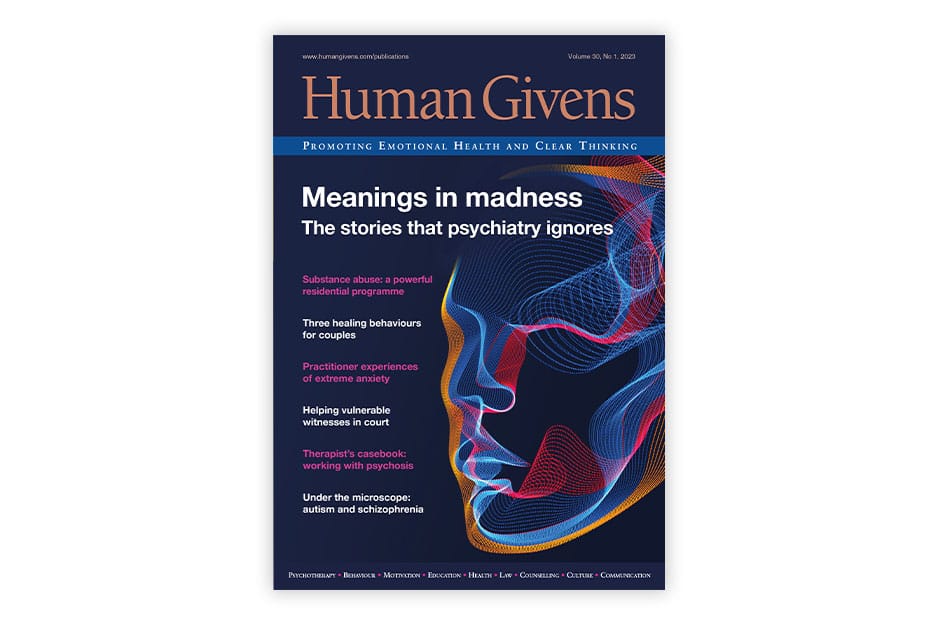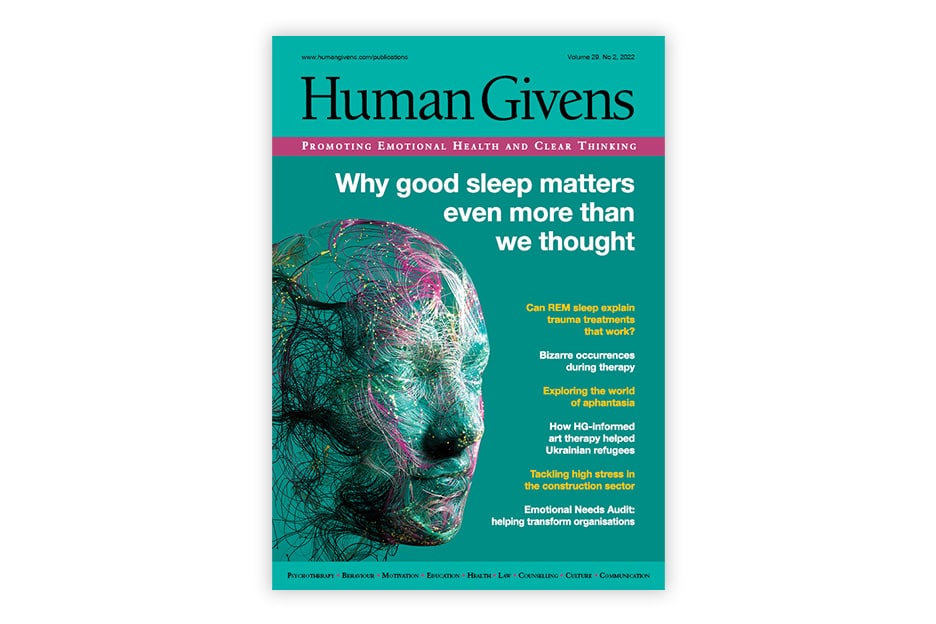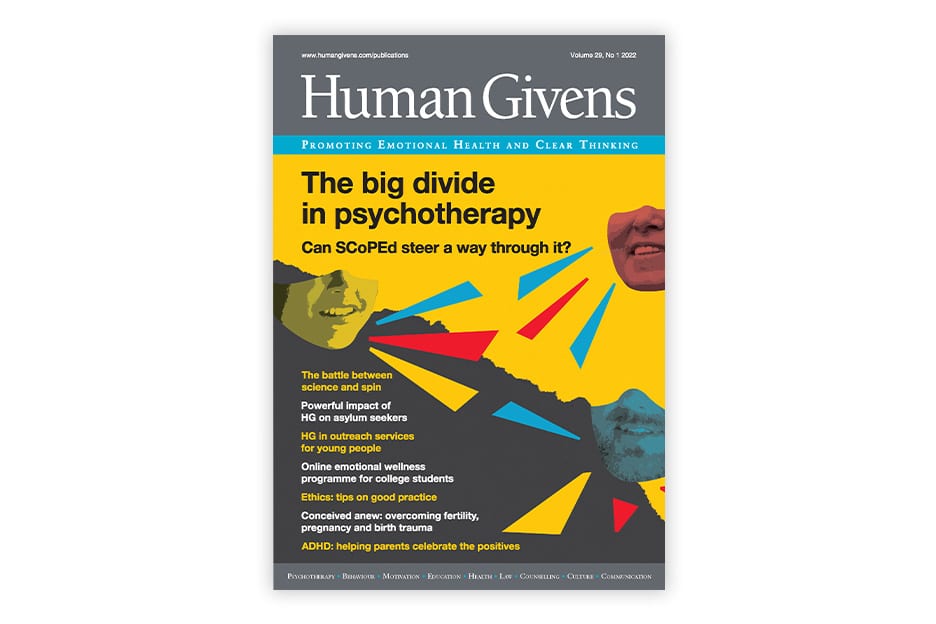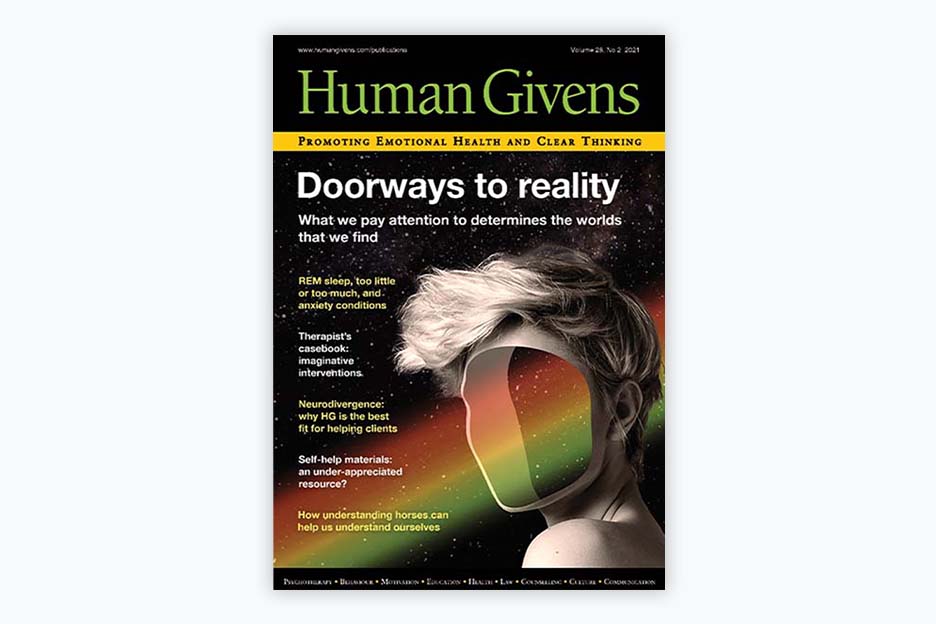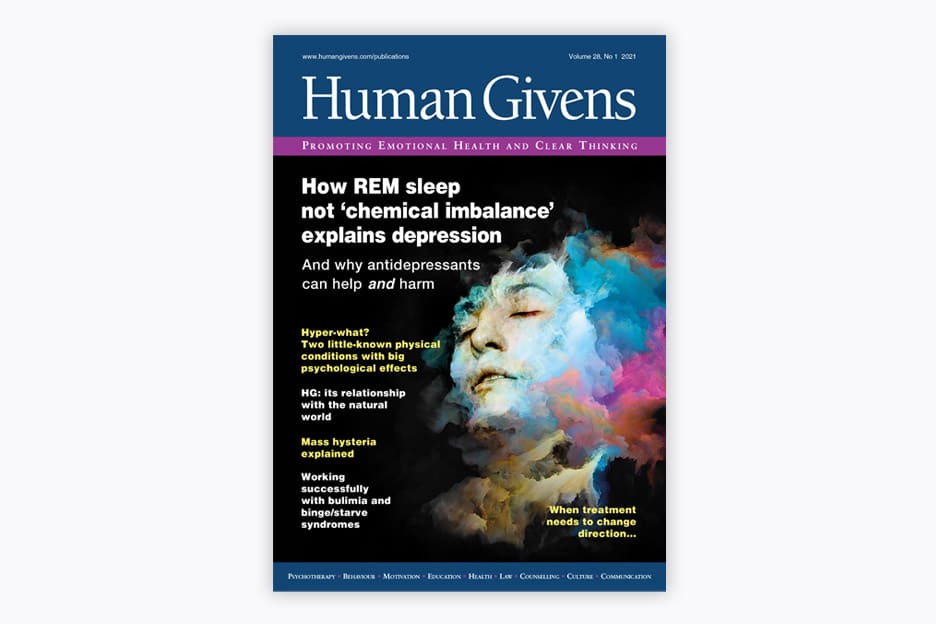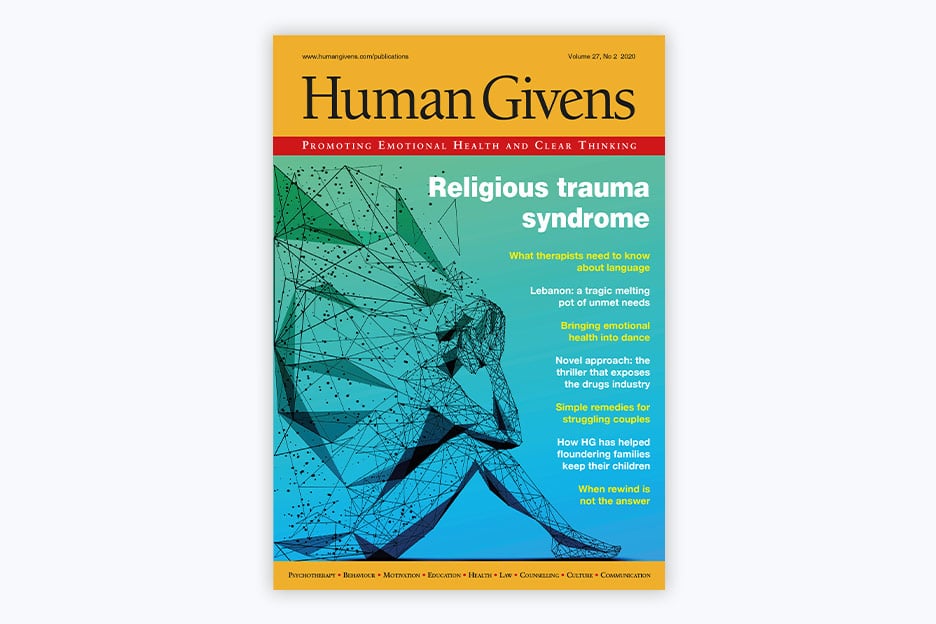The Human Givens Journal
End of an era...
What will sadly be the last issue of the Human Givens Journal has just been published – as ever, it’s packed full to the brim with interesting articles, interviews and more.
Ivan Tyrrell started the journal, then known as The Therapist, over 30 years ago to provide a platform for exploring the most effective ways to help people and to bring common sense to psychotherapy and counselling, which it was felt was much needed then.
Not long afterwards Denise Winn joined the team and has been its wonderful editor for well over 20 years. We’ve all benefited from her expertise and judgement, superb writing skills and professionalism as a result, but, as many will know, she now wishes to step down from the role. Over the last year, we have made considerable efforts to find a new editor or even a team to take on the journal. However, despite the much appreciated keenness of many who came forward to try to help, Denise’s particular combination of skills has proved impossible to replace. Rather than reduce the standard of the journal, therefore, we took the hard decision to cease publication altogether.
We still intend to publish interesting articles in the future or come up with an alternative form of reporting back on human givens ideas, progress and news, but for the moment this is where we stand. Sign up to the HG newsletter to be kept informed.
There are still lots of back issues to explore, which give you a wonderful resource, full of tips, insights and fascinating interviews and inspiring articles and case histories – explore all issues >
19.12.23
Each issue of Human Givens: promoting emotional health and clear thinking is packed full of fascinating stories, new research findings, insights, articles, interviews, case histories, research, book reviews and letters (we do not take advertising). The official journal of the Human Givens Institute, it provides much of the best writing on human psychology and behaviour currently available.
Published biannually in print and digital format, the HG Journal as it’s often called, continually explores the significance of new knowledge about human psychology, biology and behaviour wherever it has an impact on people’s lives — for instance, in the areas of health, welfare, education, work, family life, communication, business and the law — and looks in detail at how people are using this knowledge to improve the effectiveness of their work, whatever their field of expertise.
Written in clear, non-jargonistic language, it provides a convenient easy way to keep up to date with the latest thinking and advances, and how this knowledge is being implemented across a wide range of areas.
The latest issues
How can we best approach the psychological pressures of living in our modern world… ?
There is currently much uncertainty among professionals and politicians about the best way to approach the psychological problems of living in our modern world: how best to educate our children; help unsocialised young adults; treat the rising rates of anxiety and depression; work with addicts; and grapple with the chaotic consequences of broken families, etc.
A new organising idea
Whenever there is widespread uncertainty like this, a new ‘organising idea’ is usually needed, to bring clarity and a wider perspective to the issues. An organising idea plays an active role in shaping perception, thinking and research, and is always big enough to encompass and create a context for earlier ideas which may have tackled problems piecemeal.
The human givens approach is a new organising idea founded on a solid basis of fundamental research. It is driven by our ever increasing scientific knowledge about human biology, behaviour and psychology — and an interest in how best to put such knowledge to practical use.
What are the human givens?
Human givens are what we are all born with: our essential biological and emotional needs and the innate resources that we have evolved in order to fulfill them.
Our emotional needs include:
- the need for security (stable home life and a safe territory to live in)
- the need for intimacy and friendship
- the need to give and receive attention
- the need for a sense of autonomy and control
- the need to feel connected to others and be part of a wider community
- the need for self-esteem (achieved through emotional maturity, successful learning and the effective application of skills)
- the need for privacy
- the need for meaning and purpose.
Our tools and resources include:
- curiosity
- memory and the ability to forget
- the ability to problem solve
- the ability to focus attention
- imagination
- the ability to understand through metaphor (pattern matching)
- self-awareness
- resilience
- the ability to empathise and connect with others
- a rational as well as an emotional brain.
Achieving mental and physical health
Those who are able to have their needs met in healthy and balanced ways and who have access to their innate resources are more likely to be mentally and physically healthier, more stable and better integrated. Those whose needs are not fulfilled, or whose innate resources are damaged or used incorrectly, may suffer considerable distress or develop, as a means of coping, antisocial behaviours which are a burden to others or to society at large.
Human Givens is a magazine for those who wish to draw on a valuable body of knowledge, derived from scientific findings and developed through experience, for motivating and helping people most effectively.
There are hundreds of different types of counselling and psychotherapy models and whether they work or not always depends on how closely they are aligned to what is known about biological, psychological and behavioural functioning — the human givens. In the same way, in the evolution of heavier-than-air flying machines, the effectiveness of a new design — i.e. whether the machine flew — depended on how closely it was aligned to the ‘givens’ of gravity, the laws of physics and aerodynamics.
Effective ways to help people
The human givens approach, by definition, encompasses all effective ways to help people and shows us why some approaches are inevitably doomed to fail. Wherever people come purposefully together in groups or communities, the fulfilment and use of the human givens are basic to the achievement of joint aims. The human givens approach therefore has equal relevance for the worlds of education, work, law and social services.
Greater insight into wider issues
We are living in a time when more and more people seem to need help in dealing with the rapid changes in society. Depression, anxiety, anger, addiction and other mental and social problems are on the increase everywhere. Effective help can only come from those who are coping well, and who are adaptable, perceptive and informed about human nature. It is to those seeking greater insight into the wider issues and a clearer view about how to really help people cost effectively that this magazine is dedicated.
Human Givens was the successor to The New Therapist which had an avid readership as a multidisciplinary journal. Its strong reputation was built upon its reliable and thought-provoking content and the willingness to take an iconoclastic stance when necessary. However, as many of those who would find the journal’s content of interest do not regard themselves as therapists, the editorial board decided upon a name change which both acknowledges this and reflects the fast growing interest in the human givens approach among health and education professionals, and increasing numbers of the general public interested in psychology and human behaviour.
